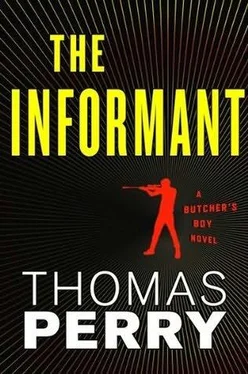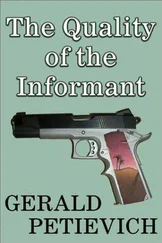Thomas Perry - The Informant
Здесь есть возможность читать онлайн «Thomas Perry - The Informant» весь текст электронной книги совершенно бесплатно (целиком полную версию без сокращений). В некоторых случаях можно слушать аудио, скачать через торрент в формате fb2 и присутствует краткое содержание. Жанр: Триллер, на английском языке. Описание произведения, (предисловие) а так же отзывы посетителей доступны на портале библиотеки ЛибКат.
- Название:The Informant
- Автор:
- Жанр:
- Год:неизвестен
- ISBN:нет данных
- Рейтинг книги:5 / 5. Голосов: 1
-
Избранное:Добавить в избранное
- Отзывы:
-
Ваша оценка:
- 100
- 1
- 2
- 3
- 4
- 5
The Informant: краткое содержание, описание и аннотация
Предлагаем к чтению аннотацию, описание, краткое содержание или предисловие (зависит от того, что написал сам автор книги «The Informant»). Если вы не нашли необходимую информацию о книге — напишите в комментариях, мы постараемся отыскать её.
The Informant — читать онлайн бесплатно полную книгу (весь текст) целиком
Ниже представлен текст книги, разбитый по страницам. Система сохранения места последней прочитанной страницы, позволяет с удобством читать онлайн бесплатно книгу «The Informant», без необходимости каждый раз заново искать на чём Вы остановились. Поставьте закладку, и сможете в любой момент перейти на страницу, на которой закончили чтение.
Интервал:
Закладка:
The Informant
Thomas Perry
1
It was Monday afternoon when he drove the white van up the driveway and stopped it at the side door of the house. He pulled his blue baseball cap down securely, leaned to the seat beside him, and picked up the aluminum clipboard with its layers of invoices. As he slid down from the seat to the driveway, he reached into his blue coveralls and retrieved a ballpoint pen. He hadn't had the time to stop and pick up the perfect tools for this, but what he had would probably do. If not, people often had the right things around the house. He rang the doorbell, listened for footsteps, then rang again.
Heavy footsteps, coming quickly. He could tell from their nearness that the first ring would have been enough. The door swung open. The man was taller than he was, younger and thicker around the chest. The man glowered, and the space between his dark eyebrows and his dark, wavy hair looked very small, pinched and wrinkled with annoyance. "Mr. Delamina?"
"Yeah. What can I do for you?"
"I've got a delivery for you."
"I didn't order anything." He prepared to close the door.
"It looks like a gift." He held up the clipboard. The invoice was filled out in big, clear letters. Under QUANTITY it said "1 ea." Under DESCRIPTION it said "Sony Bravia EX500," and under AMOUNT it said "$2,199." But below that in big block letters, it said PAID.
"Are you sure it's the right address?" He was a bit suspicious, but he had seen the invoice, and his greed had been stimulated. He was thinking it might be a mistake, but somehow he could still end up with something valuable.
"Yes. You're Michael Delamina?"
"Right." Delamina's small eyes moved to the truck then to the invoice, not finding a reason not to be interested.
"Then you got a new high-definition flat screen. I need to take a look at where it goes." He stepped up on the porch, and something about his brusque, hurried manner made Delamina step backward, letting him inside.
It was a large, modern kitchen with black granite counters and a black granite island, with an array of copper pots hanging from a rack above it. He took two steps inward and swerved to go around the island. As he passed it, his free hand plucked one of the black-handled kitchen knives from a slot in the butcher block beside the cutting board. As he had expected from the width of the slot, it was the boning knife. When he was working, the proper tools seemed to find their way to his hand.
He pivoted to the left and brought the knife around so his body added force to the thrust, and the eight-inch blade was lodged to the handle in the space just below Delamina's rib cage. He stepped forward with it and pushed upward. As he did, he said quietly, "I'm the one you sent people to find. Go join them." Delamina went limp, fell onto the kitchen floor, and lay there, his eyes open and losing focus.
He stood above Delamina for a moment, watching. He was fairly sure that his upward, probing thrust had reached the heart. This was a crude, elementary way of killing a man. It was actually one of the things that prison inmates did to one another. When they pushed a blade upward they tried to move it around a bit, like a driver manipulating a standard transmission, so they called it "running the gears" on someone. But he hadn't wished to have Delamina's death look like expert workmanship. That might warn the next one that he had come back to take care of this problem. He stepped to the rack by the sink, took a clean dish towel, and wiped off the handle of the knife. He knelt on the floor for a moment and looked more closely at Delamina.
The heart and the lungs had to be stopped. The human body could take an incredible amount of battering, piercing, even burning, and heal rapidly and go on with undiminished strength for another forty years. For a pro, death had to happen right away with no uncertainty. Before he left, the person had to be dead-not dying, but dead and cooling off. He couldn't have somebody get up after he was gone. None of his ever had, but it was a concern.
He put his hand on Michael Delamina's carotid artery to be sure his heart had stopped, then tugged a button from Delamina's shirt, extracted a few inches of thread, and held the thin, white filament in front of his nostrils. The thread didn't move. He dropped it on Delamina's chest with the button, touched the artery one more time, stood, and walked.
He went out the side door of the house and got into the plain white van. He had parked so close to the side door that he only had to take two steps and he was in the driver's seat behind tinted windows. He had a red shop rag caught in the back door of the van so it hung down to cover the license plate.
He backed out of the driveway, shifted and accelerated to a moderate speed, and proceeded down the street. After he had gone a mile or two, he turned into the parking lot of a supermarket, drove around to the rear of the building, got out, and stuffed the rag, the coveralls, and the clipboard into a bag in the Dumpster. He pulled back onto the road and merged into the traffic again. He drove carefully and lawfully as he always did, and never risked having a cop pull him over. He wore the blue baseball cap and a pair of sunglasses, because he knew that if anyone saw him through the windshield, what they'd remember was a baseball cap and sunglasses. In twenty minutes he was twenty miles away, and in forty he was in another county at the lot where he had rented the van a couple of hours ago. He returned it and drove the rented car he had left on a nearby street toward the airport.
The distinguishing feature of the killing business was its premeditation. Most amateurs got caught because they were too inexperienced to look far enough ahead. They made plans to kill some enemy, but didn't devote much thought to what they would do with the body. Some of them didn't even think clearly about their alibis. It was as though the killing itself were a high wall ahead of them. They thought so much about having to climb it that they couldn't get their eyes to focus on what was beyond it.
Even the ones who bothered to construct alibis often made foolish mistakes. They would go to a movie and pay with a credit card, sneak out in the middle of the film to do the killing, and then get caught on a security camera driving back into the parking lot. Or they'd kill their wives and then call their girlfriends on their cell phones, and the phone company would have a record of which repeater tower picked up the signal.
When they didn't make mistakes, they still had trouble. The truth was, if you were the police department's favorite suspect, almost any set of precautions you took would be inadequate. If there was no real evidence of guilt, the police would start finding fibers in your car or house that were "not inconsistent" with the fibers in the dead man's clothes or carpets. A pro was never the cops' favorite suspect, because he had no clear connection with the victim.
He knew a lot about the business because he had been raised in it. His parents had been killed in a car crash when he was ten. His nearest relative was his mother's younger sister, who was in college in California and barely made it to the funeral. She had no room in her schedule for raising anybody's ten-year-old child. But a neighborhood man named Eddie Mastrewski had volunteered to take the boy in, teach him some values and the habit of work. Eddie was the local butcher, a man who drove a good car, lived in a good house, and had a reputation for honest weights and fresh meat.
In those days in a working-class neighborhood, no one thought much about it. There was a boy who needed a home for a few years, and Eddie had one. In later years, the boy suspected that the reason nobody had worried that this lifetime bachelor might be a child molester was the neighborhood's whispered knowledge that Eddie regularly made home deliveries of special cuts of meat to a few particularly attractive housewives.
Читать дальшеИнтервал:
Закладка:
Похожие книги на «The Informant»
Представляем Вашему вниманию похожие книги на «The Informant» списком для выбора. Мы отобрали схожую по названию и смыслу литературу в надежде предоставить читателям больше вариантов отыскать новые, интересные, ещё непрочитанные произведения.
Обсуждение, отзывы о книге «The Informant» и просто собственные мнения читателей. Оставьте ваши комментарии, напишите, что Вы думаете о произведении, его смысле или главных героях. Укажите что конкретно понравилось, а что нет, и почему Вы так считаете.












